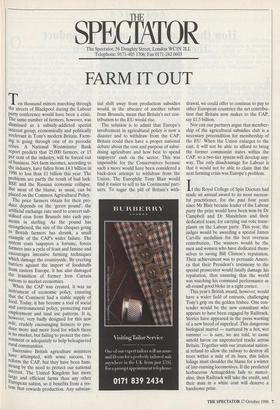SPECTATOR
The Spectator, 56 Doughty Street, London WC1N 2LL Telephone: 0171-405 1706; Fax 0171-242 0603
FARM IT OUT
Ten thousand miners marching through the streets of Blackpool during the Labour party conference would have been a crisis. The same number of farmers, however, was dismissed as a subsidy-addicted special interest group, economically and politically irrelevant in Tony's modern Britain. Farm- ing is going through one of its periodic crises. A National Westminster Bank report predicts that 25,000 farmers, or 15 per cent of the industry, will be forced out of business. Net farm incomes, according to the industry, have fallen from £4.1 billion in 1996 to less than £1 billion this year. The problems are partly the result of bad luck: BSE and the Russian economic collapse. But most of the blame, as usual, can be placed on the Common Agricultural Policy. The price farmers obtain for their pro- duce depends on the 'green pound', the artificial exchange rate used to convert sub- sidised ecus from Brussels into cash pay- ments in sterling. As the pound has strengthened, the size of the cheques going to British farmers has shrunk, a small example of the CAP's wider failure. The system costs taxpayers a fortune, forces farmers into a cycle of feast and famine and encourages intensive farming techniques which damage the countryside. By erecting barriers against the import of foodstuffs from eastern Europe, it has also damaged the transition of former Iron Curtain nations to market economies.
When the CAP was created, it was an instrument of economic policy, ensuring that the Continent had a stable supply of food. Today, it has become a tool of social and environmental policy, protecting rural employment and land use patterns. It is, however, very badly designed for this new role, crudely encouraging farmers to pro- duce more and more food for which there is no market, but failing to protect the envi- ronment or adequately to help beleaguered rural communities.
Successive British agriculture ministers have attempted, with some success, to reform the CAP, but they have been ham- strung by the need to protect our national interest. The United Kingdom has more large and efficient farms than any other European nation, so it benefits from a sys- tem that rewards production. Any substan- tial shift away from production subsidies would, in the absence of another rebate from Brussels, mean that Britain's net con- tribution to the EU would rise.
The solution is to admit that Europe's involvement in agricultural policy is now a disaster and to withdraw from the CAP. Britain could then have a proper national debate about the cost and purpose of subsi- dising agriculture and how best to spend taxpayers' cash on the sector. This was impossible for the Conservatives because such a move would have been considered a back-door attempt to withdraw from the Union. The Europhile Tony Blair would find it easier to sell to his Continental part- ners. To sugar the pill of Britain's with- drawal, we could offer to continue to pay to other European countries the net contribu- tion that Britain now makes to the CAP, say £1.5 billion.
Nor can our partners argue that member- ship of the agricultural subsidies club is a necessary precondition for membership of the EU. When the Union enlarges to the east, it will not be able to afford to bring the former communist states within the CAP, so a two-tier system will develop any- way. The only disadvantage for Labour is that it would not be able to claim that the next farming crisis was Europe's problem.
If the Royal College of Spin Doctors had made an annual award to its most success- ful practitioner, for the past four years since Mr Blair became leader of the Labour party the prize would have been won by Dr Campbell and Dr Mandelson and their dedicated team, for carrying out vote trans- plants on the Labour party. This year, the judges would be awarding a special James Carville medallion for the best overseas contribution. The winners would be the men and women who have dedicated them- selves to saving Bill Clinton's reputation. Their achievement was to persuade Ameri- ca that their President's testimony to the special prosecutor would fatally damage his reputation, thus ensuring that the world was watching his command performance as all-round good bloke in a tight corner.
This year's British award, however, would have a wider field of entrants, challenging Tony's grip on the golden frisbee. One con- tender would be the new consultant who appears to have been engaged by Railtrack. Stories have appeared in the press warning of a new breed of superleaf. This dangerous biological marvel — nurtured by a hot, wet summer — is sure, we are told, to cause untold havoc on unprotected tracks across Britain. Together with our irrational nation- al refusal to allow the railway to destroy all trees within a mile of its lines, this fallen foliage must shoulder the blame for a winter of late-running locomotives. If the predicted herbaceous Armageddon fails to materi- alise, then Railtrack will take the credit, and their man in a white coat will deserve a handsome prize.










































































 Previous page
Previous page